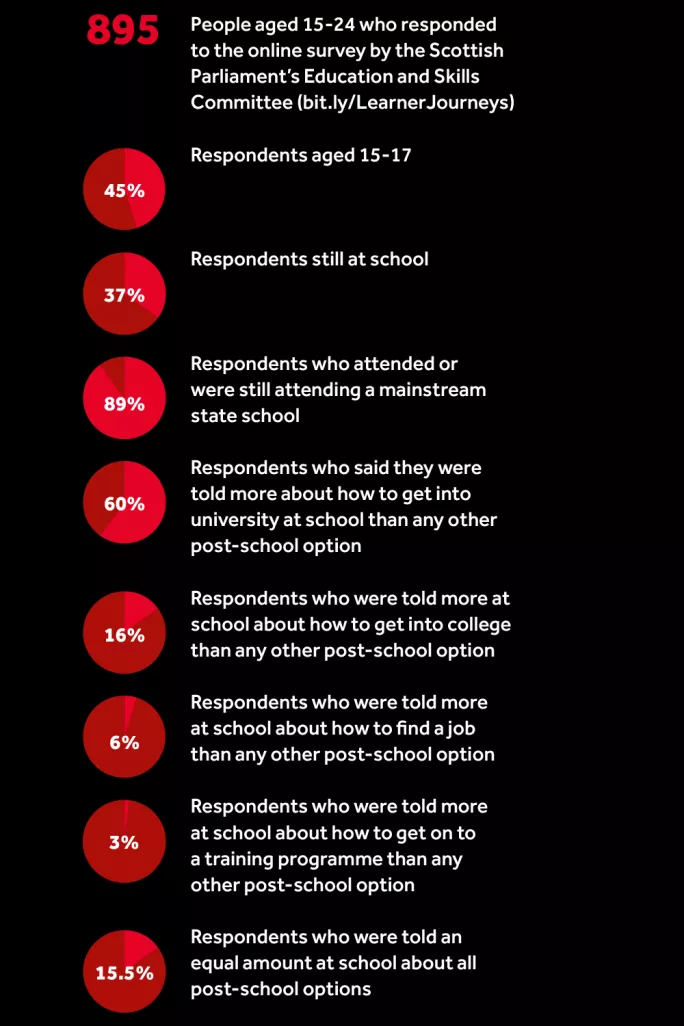Parity of esteem - as long as you’re off to university

We’re supposed to be in an enlightened era of education in which, whatever your ambitions, school will provide the platform to achieve them. The bad old days when university was the be-all and end-all, and early leavers simmered in resentment as they marked time at their desks, have long gone.
Haven’t they?
Apparently not. A survey by researchers at the Scottish Parliament paints a far more complicated picture - and suggests that many young people feel that if they are not intent on going to university, they risk finding themselves on the sidelines.
The report (see bit.ly/LearnerJourneys) raises concerns that pupils may be under pressure to aspire to university; schools are often more concerned with their “reputation” than what is best for each pupil, it suggests.
Researchers found that 60 per cent of respondents thought university was the main focus for schools when advising pupils on their future options. One young person summed up a common view: “I feel my school was more concerned with how good they look on paper than helping signpost students into different directions. University was presented as the next natural progression and [the school] did not give a great deal of support, if any, to students seeking employment, apprenticeships or college places.”

Another commenter was more blunt: “If students weren’t planning on going to university, [the school] didn’t care.”
Researchers also heard that while it was common to have a whole-year assembly about university, pupils who wanted advice on finding a job or going to college had to seek it out individually. Some complained of poor support if they planned to leave school early, with one saying: “Teachers were not interested unless you were staying on to complete Highers.”
Another said: “It looks good for the school if a high proportion of their pupils go to university. I’m lucky because I wanted to go, but people who didn’t felt pressured by teachers into pursuing something they didn’t want or weren’t ready for.”
In contrast, a smaller number said they did not receive satisfactory advice about university, as their school was more concerned with getting pupils into college or an apprenticeship.
Some did not recall receiving advice on any post-school option, and expressed deep regret about their schooldays. One said: “They just wanted to get rid of me.” Another said: “I am in care and school gave up on me.”
Euan Duncan, a professional officer for the Scottish Secondary Teachers’ Association, says that when he was a guidance teacher, he and colleges “worked hard to tailor information about post-school options according to each young person’s interests and needs” from early secondary. But he adds: “Because of the nature of the Ucas process, which can be quite intensive, I could understand why some young people might feel that university has a particular focus in schools.”
However, he says: “By the time they leave school, many young people will have already had the opportunity to experience a range of wider learning opportunities by attending college courses, engaging in work shadowing and work experience, and volunteering.”
‘Be more responsive’
Jim Thewliss, general secretary of School Leaders Scotland, which represents secondary heads, says recent changes in education policy and approaches - such as Curriculum for Excellence and the Developing the Young Workforce agenda - mean that schools now have no choice but to be “more flexible and responsive in their approach to supporting potential career choices”. He adds that workload and “shortages in all areas of the system continue to have an impact on teachers’ ability to keep all the plates spinning” while trying to help young people.
A Scottish government report on the “15-24 learner journey”, published this month (see bit.ly/1524report), acknowledges that the education system could be “Making it easier for young people to understand their learning and career choices at the earliest stage and providing long-term person-centred support for the young people who need this most.”
One of the report’s 17 recommendations is for young people to be given an online account with personalised support for choosing education courses and planning their careers (see bit.ly/CareersAccount).
Parliamentary researcher Suzi Macpherson cautions that the self-selecting nature of the Education and Skills Committee’s online survey means that the results do not necessarily apply to Scotland as a whole. Nevertheless, the committee will now explore the issues raised in a new inquiry, which will examine the advice given to pupils about what they can do after school. It will also explore the availability of vocational pathways in the senior phase of school.
Committee convener James Dornan says that deciding what to do after school is “one of the most difficult and challenging decisions we ask our young people to take”.
He adds: “University is just one choice for young people. Our committee wants to make sure that those choosing work, apprenticeships or college are given the same quality of information about these options to let them pursue the right path for them.”
You need a Tes subscription to read this article
Subscribe now to read this article and get other subscriber-only content:
- Unlimited access to all Tes magazine content
- Exclusive subscriber-only stories
- Award-winning email newsletters
Already a subscriber? Log in
You need a subscription to read this article
Subscribe now to read this article and get other subscriber-only content, including:
- Unlimited access to all Tes magazine content
- Exclusive subscriber-only stories
- Award-winning email newsletters